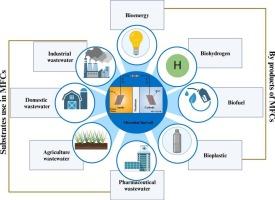释放微生物燃料电池的潜力:对底物、新兴应用和挑战的全面回顾
Q1 Environmental Science
引用次数: 0
摘要
对污水处理技术日益增长的需求需要可持续的、节能的解决方案。微生物燃料电池(MFCs)将能源生产与废水修复相结合,是一种很有前途的方法。mfc利用电活性细菌的代谢活动将有机废物转化为电能,同时解决污染和能源回收问题。本文综述了mfc中使用的各种基质,包括合成废水和工业废水,重点介绍了不同有机物对mfc效率的影响。工业废水来源,包括酿酒厂、啤酒厂、制药和生活废物,探索其在能源生产和污染物去除方面的有效性。综述了mfc在生物传感、生物制氢和农业废弃物处理等方面的应用。本文回顾了MFC设计的放大挑战、优化策略以及实际应用中的增强性能。本文旨在阐明mfc作为一种双重功能技术的作用,支持环境修复和可再生能源的产生,并将mfc定位为废水处理的可持续发展。本文章由计算机程序翻译,如有差异,请以英文原文为准。

Unlocking the potential of microbial fuel cells: A comprehensive review of substrates, emerging applications, and challenges
The increasing demands on wastewater treatment technologies necessitate sustainable, energy-efficient solutions. Microbial Fuel Cells (MFCs) present a promising approach by integrating energy production with wastewater remediation. MFCs harness the metabolic activities of electroactive bacteria to convert organic waste into electricity, addressing pollution and energy recovery simultaneously. This review examines various substrates employed in MFCs, including synthetic and industrial wastewater, highlighting the influence of different organic matter on MFCs' efficiency. Industrial wastewater sources, including winery, brewery, pharmaceutical, and domestic waste, are explored for their effectiveness in energy yield and pollutant removal. Additionally, the review discusses the applications of MFCs in biosensing, biohydrogen production, and agricultural waste treatment. Scale-up challenges, optimization strategies for MFC design, and enhanced performance for real-world applications are reviewed. This review aims to elucidate the role of MFCs as a dual-function technology, supporting environmental remediation and renewable energy generation, positioning MFCs as a sustainable advancement in wastewater treatment.
求助全文
通过发布文献求助,成功后即可免费获取论文全文。
去求助
来源期刊

Bioresource Technology Reports
Environmental Science-Environmental Engineering
CiteScore
7.20
自引率
0.00%
发文量
390
审稿时长
28 days
 求助内容:
求助内容: 应助结果提醒方式:
应助结果提醒方式:


